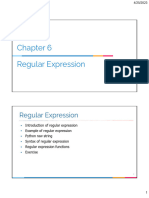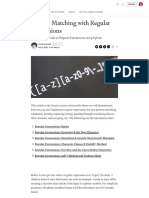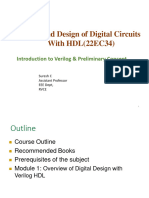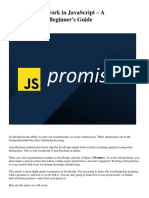Python Tutorial 32
Uploaded by
Indra Kumar SinghPython Tutorial 32
Uploaded by
Indra Kumar SinghVideo 36 : Regular Expressions 6
In this video I finish my Regular Expressions coverage. We’ll look at Or, Group, Named Groups,
More Match Object Functions and then we’ll solve some problems.
Overview of What We’ve Learned About Regex
# [ ] : Match what is in the brackets
# [^ ] : Match anything not in the brackets
# ( ) : Return surrounded submatch
# . : Match any 1 character or space
# + : Match 1 or more of what proceeds
# ? : Match 0 or 1
# * : Match 0 or More
# *? : Lazy match the smallest match
# \b : Word boundary
# ^ : Beginning of String
# $ : End of String
# \n : Newline
# \d : Any 1 number
# \D : Anything but a number
# \w : Same as [a-zA-Z0-9_]
# \W : Same as [^a-zA-Z0-9_]
# \s : Same as [\f\n\r\t\v]
# \S : Same as [^\f\n\r\t\v]
# {5} : Match 5 of what proceeds the curly brackets
# {5,7} : Match values that are between 5 and 7 in length
# ($m) : Allow ^ on multiline string
# Use a back reference to substitute what is between the
# bold tags and eliminate the bold tags
# re.sub(r"<b>(.*?)</b>", r"\1", randStr)
# Use a look ahead to find all characters of 1 or more
# with a word boundary, but don't return the word
# boundary
# re.findall(r"\w+(?=\b)", randStr)
# Use a look behind to find words starting with a number,
# period and space, but only return the word that follows
# re.findall(r"(?<=\d.\s)\w+", randStr)
# Use a negative look behind to only return numbers without
# a $ in front of them
# re.findall(r"(?<!\$)\d+", randStr)
Or Conditional
You can use | to define the matches you'll except
rand_str = "1. Dog 2. Cat 3. Turtle"
regex = re.compile(r"\d\.\s(Dog|Cat)")
matches = re.findall(regex, rand_str)
print(len(matches))
for i in matches:
print(i)
Python Problem for you to Solve
Create a regex that will match for 5 digit zip codes or zip codes with 5 digits a dash and
then 4 digits. Here is sample data :
rand_str = "12345 12345-1234 1234 12346-333"
Solution
rand_str = "12345 12345-1234 1234 12346-333”
regex = re.compile(r"(\d{5}-\d{4}|\d{5}\s)")
matches = re.findall(regex, rand_str)
print(len(matches))
for i in matches:
print(i)
Group
We can use group to retrieve parts of regex matches
bd = input("Enter your birthday (mm-dd-yyyy) : ")
bd_regex = re.search(r"(\d{1,2})-(\d{1,2})-(\d{4})", bd)
print("You were born on", bd_regex.group())
print("Birth Month", bd_regex.group(1))
print("Birth Day", bd_regex.group(2))
print("Birth Year", bd_regex.group(3))
Match Object Functions
There are functions that provide more information on your matches
match = re.search(r"\d{2}", "The chicken weighed 13 lbs")
# Print the match
print("Match :", match.group())
# Print the start and ending index of the match
print("Span :", match.span())
# Print starting index of the match
print("Match :", match.start())
# Print the ending index of the match
print("Match :", match.end())
Named Groups
You can also assign names to matches.
rand_str = "December 21 1974"
regex = r"^(?P<month>\w+)\s(?P<day>\d+)\s(?P<year>\d+)"
matches = re.search(regex, rand_str)
print("Month :", matches.group('month'))
print("Day :", matches.group('day'))
print("Year :", matches.group('year'))
Python Problem for you to Solve
Find all of the following real email addresses in this sample data.
rand_str = "d+b@aol.com a_1@yahoo.co.uk A-100@m-b.INTERNATIONAL"
Solution
rand_str = "d+b@aol.com a_1@yahoo.co.uk A-100@m-b.INTERNATIONAL"
regex = re.compile(r"[a-zA-Z0-9_.+-]+@[a-zA-Z0-9-]+\.[a-zA-Z0-9-.]+")
matches = re.findall(regex, randStr)
print(len(matches))
for i in matches:
print(i)
Python Problem for you to Solve
For your final Python / Regex problem I want you to match all of the following phone numbers
and then print them.
rand_str = "14125551212 4125551212 (412)5551212 412 555 1212 412-555-1212
1-412-555-1212”
Solution
rand_str = "14125551212 4125551212 (412)5551212 412 555 1212 412-555-1212
1-412-555-1212”
regex = re.compile(r"((1?)(-| ?)(\()?(\d{3})(\)|-| |\)-|\) )?(\d{3})(-| )?(\d{4}|\d{4}))")
matches = re.findall(regex, randStr)
print(len(matches))
for i in matches:
print(i[0].lstrip())
Thank you for taking this Regex journey with me. I hope that I was able to show you how
powerful Regular Expressions can be, while at the same time making them easy to understand
and grasp.
In the next part of my tutorial I’ll show you how to work with databases using Python.
You might also like
- Regular Expressions: Python For EverybodyNo ratings yetRegular Expressions: Python For Everybody34 pages
- mod-3-PATTERN MATCHING WITH REGULAR EXPRESSIONSNo ratings yetmod-3-PATTERN MATCHING WITH REGULAR EXPRESSIONS21 pages
- Regular Expressions: Python For EverybodyNo ratings yetRegular Expressions: Python For Everybody34 pages
- A Simple Intro To Regex With Python: You Have 2 Free Stories Left This MonthNo ratings yetA Simple Intro To Regex With Python: You Have 2 Free Stories Left This Month18 pages
- Python Regex: Re - Match, Re - Search, Re - Findall With ExampleNo ratings yetPython Regex: Re - Match, Re - Search, Re - Findall With Example10 pages
- Pattern Matching With Regular Expressions - by Zohaib Shahzad - The Startup - MediumNo ratings yetPattern Matching With Regular Expressions - by Zohaib Shahzad - The Startup - Medium8 pages
- Python Regex Cheatsheet With Examples: Re Module FunctionsNo ratings yetPython Regex Cheatsheet With Examples: Re Module Functions1 page
- 06 - Regular Expressions and Network ProgrammingNo ratings yet06 - Regular Expressions and Network Programming55 pages
- Manipulating Text with Regular Expression in pythonNo ratings yetManipulating Text with Regular Expression in python4 pages
- An Introduction To Regular Expressions (9781492082569)100% (1)An Introduction To Regular Expressions (9781492082569)17 pages
- Regular Expressions: Regular Expression Syntax in PythonNo ratings yetRegular Expressions: Regular Expression Syntax in Python11 pages
- Python Course: Session 6b - Regular ExpressionsNo ratings yetPython Course: Session 6b - Regular Expressions11 pages
- Web Services: JAX-RPC, WSDL, XML Schema, and Soap: CSI 3140 WWW Structures, Techniques and StandardsNo ratings yetWeb Services: JAX-RPC, WSDL, XML Schema, and Soap: CSI 3140 WWW Structures, Techniques and Standards76 pages
- SqlDependency - Start ( - Connect) Makes These DB Calls: Select Is - Broker - EnabledNo ratings yetSqlDependency - Start ( - Connect) Makes These DB Calls: Select Is - Broker - Enabled4 pages
- Top Level CV Qualifiers in Function ParametersNo ratings yetTop Level CV Qualifiers in Function Parameters3 pages
- GMR Institute of Technology Rajam, AP: GMRIT/ADM/F-44 REV.: 00No ratings yetGMR Institute of Technology Rajam, AP: GMRIT/ADM/F-44 REV.: 008 pages
- Ergonomic Posture Analysis of Workers Using Artificial Intelligence and Computer Vision-1No ratings yetErgonomic Posture Analysis of Workers Using Artificial Intelligence and Computer Vision-140 pages
- Notes 1- Intro to Algorithms, Karatsuba MultiplicationNo ratings yetNotes 1- Intro to Algorithms, Karatsuba Multiplication11 pages
- CSE 225 Data Structures and Algorithms: Mirza Mohammad Lutfe ElahiNo ratings yetCSE 225 Data Structures and Algorithms: Mirza Mohammad Lutfe Elahi36 pages

























































































